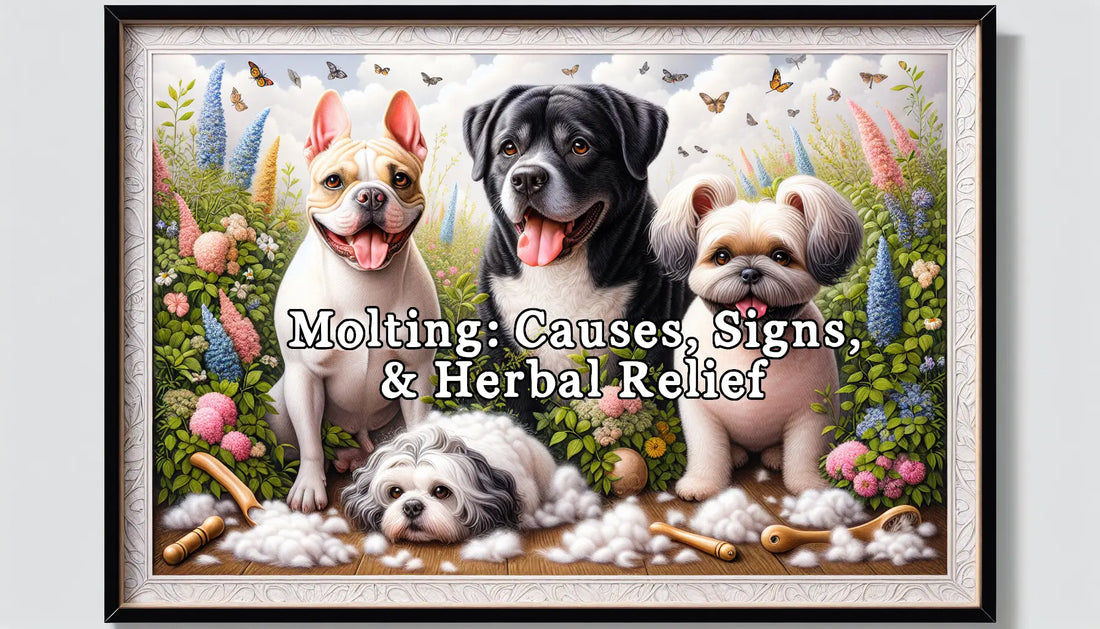Think of a Labrador Retriever, full of energy and joy, but clearly bothered by a constant need to scratch. Or maybe a French Bulldog, cute as a button but suffering silently with an uncomfortably itchy coat. As dog owners, we might have seen our four-legged friends go through similar situations, and in this blog, we will delve into understanding why and when dogs molt, the link with itching and scratching, and how this issue could be mitigated using the power of herbal supplements.
The Science Behind Dog Molting
Molting is a natural shedding process driven by hormonal changes inside a dog's body. These hormones prompt the dog to lose its old coat and make way for it to grow a new one. Molting can happen once or twice a year, depending on the breed of the dog and environmental factors, such as the changing seasons, temperature, and more.
Trigger Factors: Why and When Dogs Moult
While molting is a biological process expected in dogs, several environmental and health-related factors can affect it. Climate changes, allergies, nutritional deficiencies, and health issues like parasitic infestations are just a few triggers. A Staffordshire Bull Terrier might molt more when the seasons are changing, or a Shih Tzu might seem more bothered due to a food allergy exacerbating the molting stage.

The Itch and Scratch Story: Symptoms and Challenges
Molting often comes with its own set of symptoms, such as itching and scratching. Dogs can find this highly irritating and uncomfortable, and excessive itching might lead to complications such as skin inflammation and potentially infected wounds. It's crucial to understand these symptoms to ease the discomfort for your furry companion promptly.
Herbal Supplements: A Soothing Solution to Dog Allergies
Herbal supplements can be a great way to help dogs struggling with allergies that make molting symptoms even worse. These herbal superheroes offer natural, safe assistance in combating allergic reactions, including the dreaded itching and scratching, by enhancing the dog's immune system. They do so without bringing along any side effects often linked with traditional medications.
- Turmeric: Contains curcumin, known for its anti-inflammatory properties. Turmeric can help reduce skin inflammation and itching in dogs, especially those suffering from allergies or skin conditions.
- Astragalus Root: Known for its immune-boosting and anti-inflammatory properties. Astragalus root can help improve skin health and reduce itching caused by immune-related skin conditions.
- Hemp Seed Oil: Rich in essential fatty acids, hemp seed oil helps moisturize the skin and reduce dryness and itching. It's beneficial for dogs with dry skin or dandruff.
- Apple Cider Vinegar: When diluted, apple cider vinegar can be a natural remedy to soothe itchy skin. Its antibacterial properties can also help with skin infections that cause itching.
- Salmon Oil: High in omega-3 fatty acids, salmon oil helps improve skin health, reduce inflammation, and alleviate itching. It's particularly effective for dogs with allergies or skin irritations.
When To Consult A Vet
While herbal supplements can help manage many symptoms related to molting and allergies, they aren't a substitute for professional veterinary care. Severe or persistent molting, itching, or scratching should always be assessed by a veterinarian. Be wary of any changes in your pet's behaviour or condition and do not hesitate to seek professional help when necessary.
Conclusion
Our beloved Shih Tzus, French Bulldogs, Labradors, and Staffordshire Bull Terriers all go through molting, itching, and scratching during specific periods of their lives. While it's a natural process, it's not comfortable. Thankfully, nature has provided us with herbal supplements that, when combined with other active ingredients, can help manage these symptoms. Always remember to seek advice from your vet and try out our natural herbal treats. Available for just £19.99 with free delivery, and a money-back guarantee, our UK-based customer care team is always ready to assist you with your pet's needs.


